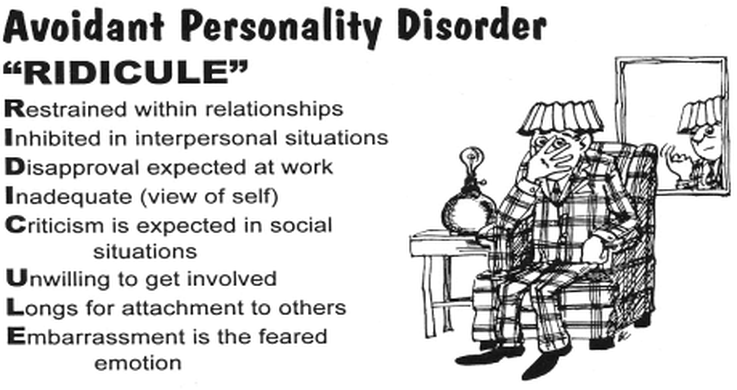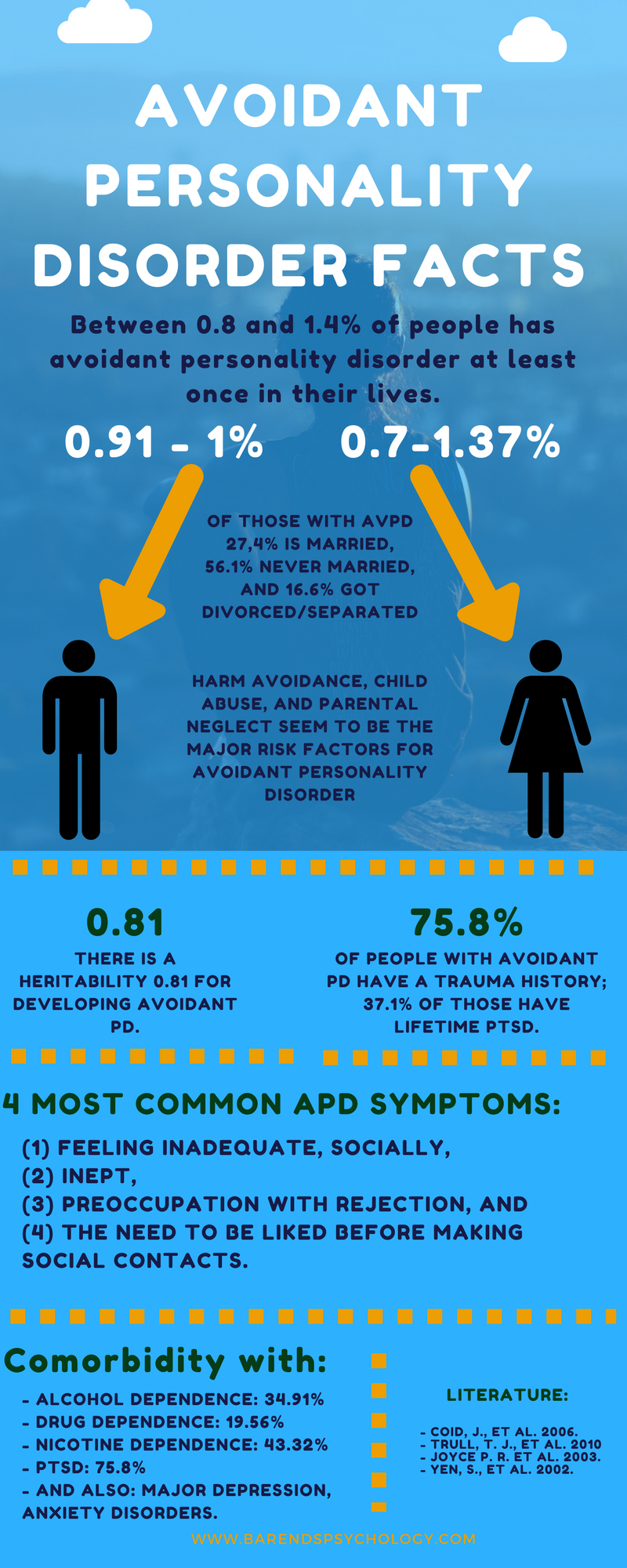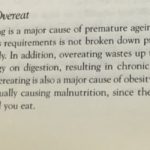
What is Avoidant Personality Disorder (AvPD) & What Can Be Done About It
What is What is Avoidant Personality Disorder (AvPD)
(If you align with 4 or more please see professional advice)
– Hate rejection and even when they open up they’ll constantly worry that they’ll be judged.
– Avoids physical contact.
– Very emotional on the inside. They don’t talk about it.
– It takes a long time for them to open and feel close with someone. Sometimes pulling back and only giving as much as they can for that moment.
– Very self critical. You know the human nature bit of when people get 10 compliments and 1 criticism, people focus on the criticism? Well avoidants really beat themselves over that one criticism. Lots of self loathing.
– Hypersensitivity to negative evaluation, feelings of inadequacy.
– Avoiding occupational activities that require significant interpersonal contact because of fear of criticism, disapproval or judgement.
– Not willing to get involved unless certain of being liked.
– Shows restraint in intimate relationships for fear of shame and ridicule.
– Self-view as socially inept, personally unappealing or inferior to others.
– Unusually reluctant to take part in activities or try something new as they may prove to be embarrassing.
– It’s long lasting and pervasive.
Avoidant Personality in 3 Minutes
Avoidant Personality Disorder in a Minute
What Causes Avoidant Personality Disorder – AvPD
– Neglect. Causes feelings of worthlessness, mistrust.
– Physical and emotional abuse.
– Half of the issues are environmental factors.
– Lower amount of the expression of love and pride, an increased amount of intolerance, shame and guilt.
– Behavioural inhibition: shy, avoids new experiences, etc.
– In the narcissistic household the scapegoat is more likely to have AvPD because of being the supply to the narcissistic parent and golden child. What are the Signs of a Narcissist in Your Life – An In-depth Summary
– They did not learn coping mechanisms or the environment did not have adequate learning opportunity.
Avoidant personality disorder & Narcissistic abuse link?

Some things to understand
– It starts happening in early adulthood.
– It is said to affect 1% of people but because of it’s nature people with this issue do not come forward or see therapy.
– People with AvPD are more likely to also have social anxiety disorder and to add to the confusion it is also known as social phobia.
– When avoidants get excited or even experience happy emotions too much, part of them thinks that it is anxiety so they freak out. This is why they don’t want to do anything too stimulating for their birthday. They want people around but not focused on them. Sounds a lot like introverts to me – Some Useful Info to Understand Introverts.
– They don’t ask for help and are pretty independent or mask their loneliness by achieving and doing so much that it masks their issues.
– They’ve felt that their primary care giver has no intention to know them or care for them so the self-defence mechanism is to think that there is nobody to know or care for, to focus on things and the world is just a physical aspect. The world is just measurable, weighable, etc.
– In relationships avoidants do something called breadcrumbing where its like not being super interested in someone, but continuing to lead someone on.
Solutions, Treatment & Healing
– CBT (Cognitive Behavioural Therapy):
Although it’s the go to therapy for AvPD I’ve found a lot of testimonials saying that it’s only the go to one because there is nothing better and that it doesn’t work that well all the time.
Anyway CBT deals with Trigger/Situation where the cycle is Thought > Feelings > Behaviour. So it’s the meaning we give to an event. Sound in the night can make you angry if it’s a drunk son, scared if intruder, concerned if the cat hurt itself.
Thoughts are going to be future based, feelings will make you anxious, behaviour is to avoid.
The cycle can be broken by thinking differently, behaving differently and that will help you feel differently.
Resource: All CBT Cognitive Therapy Techniques, Anxiety, Depression, OCD, Trauma, Psychosis with Summary
DBT (Dialectical Behaviour Therapy):
– Again not man positive testimonials. I looks like different parts of the therapies help different people and for a limited amount of time.
– It’s combined with CBT and some apparently Buddhist therapies of being aware and mindful.
– DBT has 2 parts.
1 – You see a therapist usually an hour a week.
2 – DBT group.
– There are 4 modules.
1 – Mindfulness.
2 – Distress tolerance where you distract yourself with ACCEPTS (Activities, Contribute, Comparisons, Emotions, Push away, Thoughts & Sensations).
3 – Emotion regulation where CBT comes into this.
4 – Interpersonal effectiveness where you communicate with better emotions.
– When being self-critical remember not to beat yourself up over it. See: How to Handle Criticism and Negativity
– Gaining insight to their behaviours and getting their needs met in a healthy way.
– Medication is not usually recommended.
– Parents can start showing some more interest in what the child wants and needs or is capable of instead of enforcing what they want from the child. Choosing the right language or giving unconditional love instead of disowning the child when they do something wrong and loving them when the do something favourable in the parents eyes. See: 10 Ways to Discipline Your Child by Dr. Christian Conte
– If you are in a relationship make sure you’re not making too many promises and then not following through with them. Making plans and then changing or not being interested last minute. Especially if it’s something important make sure you commit and stick to the important ones and try to not commit to the smaller ones that way you are not breaking promises.
Positives of AvPD
– Hyper aware of others and situations. See this link if your hyper awareness is working against you – What is Hyper-Vigilance? Symptoms, Signs and Solutions
– They are happy to share the spotlight.
– Because it’s hard to open up when they do they are very dedicated friends.
– Because they’re so scared or judgement and self-critical they will be less judgemental to you… unless they feel you’re judgemental to them!
– Diligent workers as they don’t small talk much.
I’m sure there is much more to it but hopefully this helps you get started with identifying it and finding something that works for you.
Bonus: The Attachment Theory: How Childhood Shapes Your Life
Secure, Anxious Ambivalent, Anxious Avoidant, Anxious Disorganised



